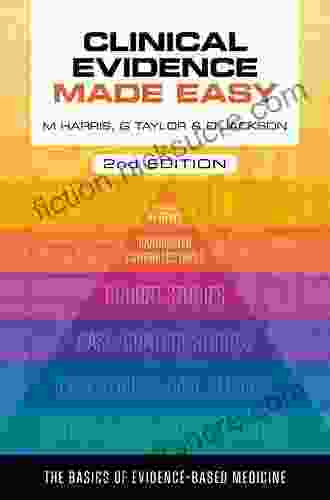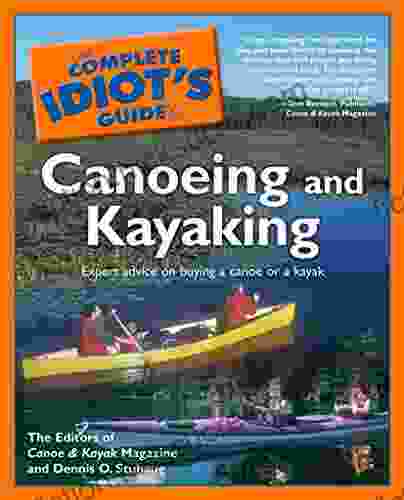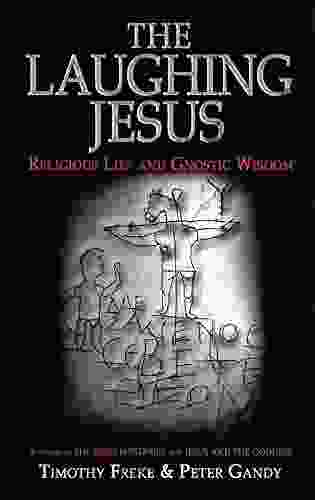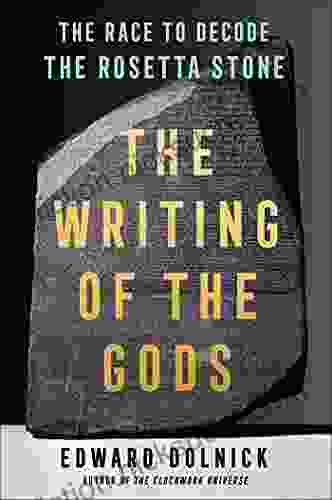The Race To Decode The Rosetta Stone: An Extraordinary Journey Of Linguistic Discovery

In the annals of archaeology and linguistics, the Rosetta Stone stands as an enigmatic and pivotal artifact, a key that unlocked the secrets of a lost civilization and revolutionized our understanding of ancient Egypt. Its discovery in 1799 ignited a race among brilliant minds to decipher its mysterious script, a pursuit that would culminate in one of the most extraordinary achievements in the history of scholarship.
4.6 out of 5
| Language | : | English |
| File size | : | 55026 KB |
| Text-to-Speech | : | Enabled |
| Screen Reader | : | Supported |
| Enhanced typesetting | : | Enabled |
| Word Wise | : | Enabled |
| Print length | : | 314 pages |
The Stone's Mysterious Origins
The Rosetta Stone is a slab of dark basalt, measuring approximately 3 feet by 2 feet, discovered by French soldiers in the ruins of Fort Julien, near the town of Rosetta, Egypt. Its enigmatic surface bore three inscriptions: the upper text in ancient Egyptian hieroglyphics, the middle text in Demotic script, and the lower text in Greek. The Greek text, fortunately, contained a known decree issued by a council of priests in Memphis in 196 BC, honoring the coronation of Ptolemy V Epiphanes. This crucial clue provided the key to unlocking the secrets of the other two scripts.
Early Attempts at Decipherment
The Rosetta Stone's discovery set off a flurry of scholarly activity as researchers sought to unravel its secrets. Among the first to attempt its decipherment was the Swedish scholar Johan David Åkerblad, who made some early progress in deciphering the Demotic script. However, the true breakthrough came from a young French linguist named Jean-François Champollion.
Champollion's Linguistic Genius
Champollion possessed an extraordinary linguistic talent, with a deep understanding of ancient languages and scripts. He had long been fascinated by the hieroglyphics of ancient Egypt and had spent years studying them. When he acquired a copy of the Rosetta Stone text, he was determined to unravel its mysteries.
Champollion's approach was meticulous and systematic. He compared the three texts, looking for similarities and patterns. He identified a group of characters in the hieroglyphic text that he believed represented the name of Ptolemy. By comparing these characters with their known phonetic values in the Greek text, he was able to assign phonetic values to several hieroglyphic signs.
A Gradual Unraveling
Champollion's work progressed slowly but steadily. He identified more and more hieroglyphic signs, gradually building up a vocabulary of ancient Egyptian. He also discovered that hieroglyphics could represent both sounds (phonetically) and ideas (ideographically). This dual nature of the script made decipherment even more challenging but also more fascinating.
In September 1822, Champollion published his breakthrough findings in a letter to the French Academy of Inscriptions and Belles-Lettres. This publication sent shockwaves through the scholarly world and established Champollion as the father of Egyptology.
A Race With Thomas Young
It is important to note that while Champollion is widely credited with deciphering the Rosetta Stone, he was not the only scholar involved in the race to decode the artifact. Another notable figure in this pursuit was the English polymath Thomas Young. Young had also made significant progress in deciphering the Demotic script and had independently identified some hieroglyphic signs, including the cartouches of Ptolemy and Cleopatra. However, his work was overshadowed by Champollion's more comprehensive and systematic approach.
The Stone's Legacy
The decipherment of the Rosetta Stone had a profound impact on the study of ancient Egypt and linguistics. It unlocked a wealth of knowledge about ancient Egyptian history, culture, and religion. Scholars were finally able to read and understand the inscriptions on temples, tombs, and other artifacts, revealing a civilization that was far more advanced and sophisticated than previously imagined.
The Rosetta Stone also revolutionized the study of linguistics. It provided a crucial link between ancient languages, allowing scholars to trace the evolution of writing and language systems. It also demonstrated the power of comparative linguistics, a method that compares different languages to uncover their historical relationships.
A Symbol of Triumph
Today, the Rosetta Stone is housed in the British Museum in London, where it remains one of the most iconic artifacts in history. It serves as a testament to the ingenuity and perseverance of those who sought to unlock its secrets, and a symbol of the transformative power of human knowledge.
The race to decode the Rosetta Stone was a thrilling and intellectually challenging endeavor that forever altered our understanding of the ancient world. The efforts of scholars like Champollion and Young not only opened the door to a lost civilization but also laid the foundation for modern linguistics and archaeology. The Rosetta Stone remains an enduring symbol of human curiosity, linguistic brilliance, and the transformative power of knowledge.
4.6 out of 5
| Language | : | English |
| File size | : | 55026 KB |
| Text-to-Speech | : | Enabled |
| Screen Reader | : | Supported |
| Enhanced typesetting | : | Enabled |
| Word Wise | : | Enabled |
| Print length | : | 314 pages |
Do you want to contribute by writing guest posts on this blog?
Please contact us and send us a resume of previous articles that you have written.
 Fiction
Fiction Non Fiction
Non Fiction Romance
Romance Mystery
Mystery Thriller
Thriller SciFi
SciFi Fantasy
Fantasy Horror
Horror Biography
Biography Selfhelp
Selfhelp Business
Business History
History Classics
Classics Poetry
Poetry Childrens
Childrens Young Adult
Young Adult Educational
Educational Cooking
Cooking Travel
Travel Lifestyle
Lifestyle Spirituality
Spirituality Health
Health Fitness
Fitness Technology
Technology Science
Science Arts
Arts Crafts
Crafts DIY
DIY Gardening
Gardening Petcare
Petcare Jason Scotts
Jason Scotts Eileen Bailey
Eileen Bailey Michelle Maccarthy
Michelle Maccarthy Dk
Dk Linda Whitenton
Linda Whitenton Eileen Edna Power
Eileen Edna Power 1st Edition Kindle Edition
1st Edition Kindle Edition George E Tinker
George E Tinker Anna Rashbrook
Anna Rashbrook Karl Polanyi
Karl Polanyi Mike Carter
Mike Carter Kathryn Allen Rabuzzi
Kathryn Allen Rabuzzi Jane Mersky Leder
Jane Mersky Leder Richard Barrett
Richard Barrett Randy Vance
Randy Vance Betsy Childs Howard
Betsy Childs Howard Carlo Zen
Carlo Zen Emma Vanstone
Emma Vanstone Michael Edelson
Michael Edelson Pam England
Pam England J T Williams
J T Williams Donald Fenna
Donald Fenna The Mindset Warrior
The Mindset Warrior David D Burns
David D Burns M Helbig
M Helbig Starr Casas
Starr Casas Jim Al Khalili
Jim Al Khalili Barbara Ehrenreich
Barbara Ehrenreich Dennis L Thombs
Dennis L Thombs Leon Pantenburg
Leon Pantenburg Susan Campbell Bartoletti
Susan Campbell Bartoletti Richard Louv
Richard Louv Steve Sleight
Steve Sleight Charles Rubin
Charles Rubin David Olusoga
David Olusoga Jed Jurchenko
Jed Jurchenko Monica Gribben
Monica Gribben Petr Beckmann
Petr Beckmann Sterling Test Prep
Sterling Test Prep Lawrence Goldstone
Lawrence Goldstone Julie Sondra Decker
Julie Sondra Decker Angie Green
Angie Green Elizabeth Harmon
Elizabeth Harmon Jillian Dodd
Jillian Dodd Jillian M Parsons
Jillian M Parsons Ziya Tong
Ziya Tong Robb Manning
Robb Manning Stephanie Greer
Stephanie Greer Pass Your Class
Pass Your Class Jenny Han
Jenny Han Kathy Malloch
Kathy Malloch Sir Isaac Newton
Sir Isaac Newton Keith H Basso
Keith H Basso Sylvia Hood Washington
Sylvia Hood Washington Steven Pustay
Steven Pustay Peter Fretwell
Peter Fretwell Alfred S Posamentier
Alfred S Posamentier Mary O Kane
Mary O Kane Arin Murphy Hiscock
Arin Murphy Hiscock Randall Bell
Randall Bell Kamran Nazeer
Kamran Nazeer Pam Coburn
Pam Coburn Grant Cunningham
Grant Cunningham Michael Geers
Michael Geers Russell King
Russell King Julia Scheeres
Julia Scheeres Scott Bestul
Scott Bestul Scott Davis Howard
Scott Davis Howard Kelley Armstrong
Kelley Armstrong Michael Conway
Michael Conway Carl Zimmer
Carl Zimmer Julia Albu
Julia Albu Sydney Brake
Sydney Brake Mike Schultz
Mike Schultz Jack Harris
Jack Harris John Steinbreder
John Steinbreder Christine M Benton
Christine M Benton Carolyn P Henly
Carolyn P Henly Jason Padgett
Jason Padgett Jane Nelsen
Jane Nelsen Izaak Walton
Izaak Walton Martise Moore
Martise Moore Lidia Stanton
Lidia Stanton Doug Cook
Doug Cook Jamie Della
Jamie Della P J Hatton
P J Hatton Richard A Mann
Richard A Mann Ryan Burden
Ryan Burden Kindle Edition
Kindle Edition Laura Michaud
Laura Michaud Peter Mcdougall
Peter Mcdougall John Allyn
John Allyn Glenn Whitman
Glenn Whitman Theodore Brun
Theodore Brun Jack Lagan
Jack Lagan John Balzar
John Balzar Carolyn Highland
Carolyn Highland Print Replica Kindle Edition
Print Replica Kindle Edition Stan Utley
Stan Utley Stephen Singular
Stephen Singular Kathleen Bartholomew
Kathleen Bartholomew Ben Stoeger
Ben Stoeger Paul Bellow
Paul Bellow Zainab Yate
Zainab Yate Massad Ayoob
Massad Ayoob Lauren Drain
Lauren Drain J M Hofer
J M Hofer Jacob Copeman
Jacob Copeman Laura Pavlov
Laura Pavlov Garth Nix
Garth Nix John Rousmaniere
John Rousmaniere Steve Barrett
Steve Barrett Drew Smith
Drew Smith Mindy Cockeram
Mindy Cockeram Catherine Legrand
Catherine Legrand Nathan Fox
Nathan Fox United States Air Force
United States Air Force Patty Hahne
Patty Hahne Ron Thomson
Ron Thomson John Sabino
John Sabino Rachel Mitchell
Rachel Mitchell Holland C Kirbo
Holland C Kirbo Roald Amundsen
Roald Amundsen Larry Dean Olsen
Larry Dean Olsen Dr Ron M Horner
Dr Ron M Horner David E Kaplan
David E Kaplan Nina Manning
Nina Manning Peter Vermeulen
Peter Vermeulen Karl Fulves
Karl Fulves Malachi Martin
Malachi Martin John D Kelleher
John D Kelleher Rob Reaser
Rob Reaser Jacqueline Melvin
Jacqueline Melvin Mark Chang
Mark Chang Og Mandino
Og Mandino Christine Lion
Christine Lion Joshua Bloom
Joshua Bloom Business Mind
Business Mind Mary Blewitt
Mary Blewitt David M Killoran
David M Killoran Lynn Clark
Lynn Clark Jess Mahler
Jess Mahler Neil Peart
Neil Peart Polo Tate
Polo Tate Taiwo Oduwoga
Taiwo Oduwoga Clive Webb
Clive Webb John H Falk
John H Falk Peterson S
Peterson S Martin W Ball
Martin W Ball Alison Noice
Alison Noice Vincent Chidindu Asogwa
Vincent Chidindu Asogwa Dan Branagan
Dan Branagan Benny Lewis
Benny Lewis Jane Sanders
Jane Sanders Greg Vaughn
Greg Vaughn Lilith Starr
Lilith Starr Misty Griffin
Misty Griffin Isabella Emma
Isabella Emma Rick Smith
Rick Smith Olszewski Marie Erin
Olszewski Marie Erin Patrick Sweeney
Patrick Sweeney Gil Reavill
Gil Reavill Diane Ackerman
Diane Ackerman Beverly Bell
Beverly Bell Caitlyn Dare
Caitlyn Dare Larry Larsen
Larry Larsen Elizabeth Baquedano
Elizabeth Baquedano Janet Sasson Edgette
Janet Sasson Edgette Sarah Krasnostein
Sarah Krasnostein Rohan Agarwal
Rohan Agarwal Orly Katz
Orly Katz Mike Stallard
Mike Stallard Toyo Kobayashi
Toyo Kobayashi Michael Pewtherer
Michael Pewtherer Britt Hawthorne
Britt Hawthorne Stephen Harrigan
Stephen Harrigan M J Fievre
M J Fievre Karla Marie Williams
Karla Marie Williams David Farrier
David Farrier Grantly Dick Read
Grantly Dick Read Dorothee Haering
Dorothee Haering Jan Lantier
Jan Lantier Mike Matheny
Mike Matheny Michael Martin
Michael Martin Kate Middleton
Kate Middleton Linda Lajterman
Linda Lajterman Mark J Hainds
Mark J Hainds Joseph Lumpkin
Joseph Lumpkin Sherry Simpson
Sherry Simpson Dave Bergman
Dave Bergman Molly Potter
Molly Potter Louis Berney
Louis Berney Freddie Fernandez
Freddie Fernandez Mercedes Lackey
Mercedes Lackey Turk Pipkin
Turk Pipkin Veronica Chambers
Veronica Chambers Gordon Taylor
Gordon Taylor Janet Godwin
Janet Godwin Nawuth Keat
Nawuth Keat Eric Butterworth
Eric Butterworth Anthony J Bennett
Anthony J Bennett Ivar Dedekam
Ivar Dedekam Jon Haws
Jon Haws Edward Dolnick
Edward Dolnick Michael Bamberger
Michael Bamberger Richard Carlson
Richard Carlson Lloyd Freeberg
Lloyd Freeberg Ben Greenfield
Ben Greenfield Heather Smith Thomas
Heather Smith Thomas Ascencia Pharmacy Technician Exam Prep Team
Ascencia Pharmacy Technician Exam Prep Team Veronica Roth
Veronica Roth David Kaiser
David Kaiser Shankar Vedantam
Shankar Vedantam Ron Kaplan
Ron Kaplan Chris Fitch
Chris Fitch Stanislav Grof
Stanislav Grof Vicky Cooper
Vicky Cooper Patti Feuereisen
Patti Feuereisen David Levithan
David Levithan Kay Burningham
Kay Burningham Alan Agresti
Alan Agresti Kaylene Yoder
Kaylene Yoder Julietta Suzuki
Julietta Suzuki Talise Xavier
Talise Xavier John Gray
John Gray Suellen Ocean
Suellen Ocean F Brent Neal
F Brent Neal Craig Chappelow
Craig Chappelow Teresa Marrone
Teresa Marrone Stephanie Wood
Stephanie Wood Daniel S Milo
Daniel S Milo Kennedy Achille
Kennedy Achille Mike Kephart
Mike Kephart Michael Plymel
Michael Plymel Paul Barrett
Paul Barrett Delaney Ruston
Delaney Ruston Hillary Davis
Hillary Davis Ken Johnson
Ken Johnson Sean Turriff
Sean Turriff Malinda Lo
Malinda Lo Nadine Hays Pisani
Nadine Hays Pisani Bob Palmer
Bob Palmer Bryan Litz
Bryan Litz Peter Gandy
Peter Gandy Dante Fortson
Dante Fortson James Felton
James Felton Mitch Benjamin
Mitch Benjamin Guy Fieri
Guy Fieri Jonathan Gelber M D M S
Jonathan Gelber M D M S Tom Mchale
Tom Mchale Gillian Bradshaw
Gillian Bradshaw The Princeton Review
The Princeton Review Michael Deangeli
Michael Deangeli Meg Haston
Meg Haston Yves Pochet
Yves Pochet Ian Ball
Ian Ball Patricia A Jennings
Patricia A Jennings Haruki Murakami
Haruki Murakami Robert A Sadowski
Robert A Sadowski Gerald Hirigoyen
Gerald Hirigoyen Kimberly Nix Berens Phd
Kimberly Nix Berens Phd William Martin
William Martin Doug Howlett
Doug Howlett Randall Hicks
Randall Hicks Ruby Hamad
Ruby Hamad Stef Maruch
Stef Maruch Harry K Mcevoy
Harry K Mcevoy Chris Batha
Chris Batha Chris Sajnog
Chris Sajnog Melanie Marquis
Melanie Marquis Mark Mazower
Mark Mazower Tom Cunliffe
Tom Cunliffe James E Wisher
James E Wisher N L Mclaughlin
N L Mclaughlin Tim Macwelch
Tim Macwelch Ross Campbell
Ross Campbell Victor J Strecher
Victor J Strecher Sam Fury
Sam Fury Robert L Park
Robert L Park Marcia Scheiner
Marcia Scheiner
Light bulbAdvertise smarter! Our strategic ad space ensures maximum exposure. Reserve your spot today!

 Jermaine Powell2024 Florida DMV Permit Test: The Ultimate Guide to Getting Your Driver's...
Jermaine Powell2024 Florida DMV Permit Test: The Ultimate Guide to Getting Your Driver's...
 Christian CarterThe Basics of Evidence-Based Medicine: A Comprehensive Guide for Healthcare...
Christian CarterThe Basics of Evidence-Based Medicine: A Comprehensive Guide for Healthcare...
 Fyodor DostoevskyPrinceton Review GRE Premium Prep 2024: Unlock Your Graduate School Dreams
Fyodor DostoevskyPrinceton Review GRE Premium Prep 2024: Unlock Your Graduate School Dreams
 Dylan MitchellExpert Advice On Buying Canoe Or Kayak: A Comprehensive Guide For Beginners
Dylan MitchellExpert Advice On Buying Canoe Or Kayak: A Comprehensive Guide For Beginners Matthew WardFollow ·8.5k
Matthew WardFollow ·8.5k Deion SimmonsFollow ·3.9k
Deion SimmonsFollow ·3.9k Kazuo IshiguroFollow ·7.5k
Kazuo IshiguroFollow ·7.5k Fernando PessoaFollow ·16.3k
Fernando PessoaFollow ·16.3k Dan HendersonFollow ·14.3k
Dan HendersonFollow ·14.3k Jesse BellFollow ·9.9k
Jesse BellFollow ·9.9k Franklin BellFollow ·2.1k
Franklin BellFollow ·2.1k Hunter MitchellFollow ·12.2k
Hunter MitchellFollow ·12.2k

 Charles Bukowski
Charles BukowskiDead Serious: Breaking the Cycle of Teen Suicide
Teen suicide is a...

 Rick Nelson
Rick NelsonSurviving My Years in the Westboro Baptist Church: A...
In the quaint town...

 Edwin Blair
Edwin BlairBuild Your Own Semi Auto Handgun: A Comprehensive Guide...
: Empowering Aspiring...

 Steve Carter
Steve CarterThe Laughing Jesus: Unmasking Religious Lies and...
The Prevailing Paradigm of Christian...

 Brett Simmons
Brett SimmonsComprehensive Fully Illustrated Reference for Modern...
Welcome to the...

 Steven Hayes
Steven HayesFraud, Negligence, and Greed: A Scathing Exposé of the...
**** In the annals of medical malfeasance,...
4.6 out of 5
| Language | : | English |
| File size | : | 55026 KB |
| Text-to-Speech | : | Enabled |
| Screen Reader | : | Supported |
| Enhanced typesetting | : | Enabled |
| Word Wise | : | Enabled |
| Print length | : | 314 pages |




